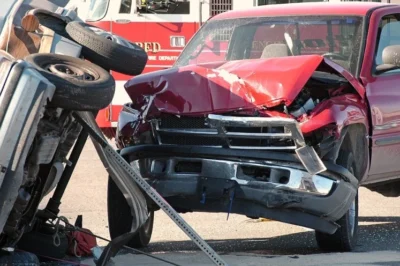What to Know About Accidents Involving Uninsured Drivers in Orlando

Getting into a car accident is stressful enough. But when the at-fault driver doesn’t have insurance, it adds another layer of frustration. In Orlando, this situation happens more often than many realize. Florida has one of the highest rates of uninsured drivers in the country. That means a simple drive to work or a trip to the grocery store can take a turn that leads to complex insurance and legal challenges.
If you’ve been hit by an uninsured driver, you’re not powerless. Florida law and your own insurance policy may offer protections you can use to pursue compensation. But timing, documentation, and understanding your coverage are key.
This guide explains your rights, outlines your options, and helps you prepare for what comes next.
The Problem of Uninsured Drivers in Florida
According to national studies, Florida ranks near the top when it comes to uninsured motorists. Estimates suggest that around 20% of drivers in the state operate their vehicles without any auto insurance. In a city like Orlando, with busy highways and tourist traffic, the chances of encountering an uninsured driver are even higher.
Florida’s insurance laws require all drivers to carry minimum personal injury protection (PIP) and property damage liability (PDL) coverage. But these minimums don’t protect you from uninsured drivers who may not follow the law. And because Florida is a no-fault state, your ability to sue an uninsured driver is limited unless your injuries meet a certain legal threshold.
What Happens After a Crash With an Uninsured Driver
Immediately after the accident, you should follow the same steps you would in any other collision. Call the police and get a report. Take pictures of the scene and your vehicle. Seek medical care if needed. Even if the other driver says they have no insurance, don’t assume the situation ends there.
Let your insurance company know about the accident right away. Depending on your policy, you may have uninsured motorist (UM) coverage that could come into play. This coverage is not required by Florida law, but many drivers choose to add it to protect themselves in case the other driver can’t pay.
How Uninsured Motorist Coverage Helps
Uninsured motorist coverage is designed to step in when the at-fault driver either doesn’t have liability insurance or flees the scene (in a hit-and-run). If you have UM coverage, it may help you recover damages for:
-
Medical bills not covered by PIP
-
Lost wages
-
Pain and suffering
-
Permanent disabilities
-
Future care costs
You’ll typically need to prove that the other driver was at fault and that they were uninsured or couldn’t be identified. You’ll also need documentation showing your medical treatment, how your injuries impacted your life, and any related expenses.
What to Do If Your UM Claim Is Denied
Even with UM coverage, insurance companies may push back. They may try to limit what they owe or argue that your injuries aren’t serious enough to justify additional compensation. If your claim is delayed, underpaid, or denied entirely, it’s a good idea to speak with a personal injury attorney familiar with Florida’s insurance laws.
Insurance companies have legal teams working to protect their bottom line. You deserve someone working to protect your rights.
When a Lawsuit Might Be an Option
Florida’s no-fault rules generally require you to seek compensation through your own insurer first. However, if your injuries are considered serious under Florida law — such as permanent scarring, disfigurement, or significant loss of bodily function — you may be able to file a personal injury lawsuit against the at-fault driver.
The challenge comes when that driver has no assets or insurance. Winning a case is one thing, but collecting a judgment from someone without the means to pay is another. That’s why uninsured motorist coverage is so important. It gives you a financial safety net when the other party cannot provide one.
What If the Driver Has Insurance But Not Enough?
Underinsured motorist (UIM) coverage works similarly to UM coverage. If the at-fault driver has insurance, but it doesn’t fully cover your damages, your UIM policy may help make up the difference. This is especially useful in cases involving serious injuries or long-term impacts where costs go beyond basic coverage limits.
Just like with UM claims, you may need to go through a formal claims process, and negotiations with your insurer may follow. Documentation and legal support can make a major difference.
Key Steps to Protect Your Rights
If you’re hit by an uninsured or underinsured driver in Orlando, follow these steps:
-
Report the accident – Get a police report. It provides critical evidence.
-
Seek medical care – Your health comes first. Delayed treatment can hurt your case.
-
Review your insurance policy – Look for UM and UIM coverage.
-
Document everything – Keep records of injuries, doctor visits, car repairs, and missed work.
-
Speak with an attorney – An experienced lawyer can help you understand your options and negotiate with insurers.
Why Legal Support Can Make a Difference
Insurance claims involving uninsured motorists can become more complicated than they seem at first. Insurance companies may deny claims based on technicalities or pressure you into accepting less than you deserve. A lawyer can evaluate your case, communicate with insurers, and, if necessary, take legal action on your behalf.
In many cases, legal help results in a faster resolution and better compensation. Most personal injury attorneys work on a contingency basis, meaning they don’t get paid unless you win your case or reach a settlement.
Don’t Assume You’re Out of Options
Just because the other driver didn’t have insurance doesn’t mean you’re left to pay for everything on your own. Whether through your own policy or legal action, you may have paths forward. The key is knowing your rights, acting quickly, and getting professional guidance when you need it.
Conclusion
Orlando’s busy roads mean accidents are always a risk — and unfortunately, some of those accidents involve uninsured or underinsured drivers. Knowing how your own insurance works and understanding Florida’s no-fault laws can help you protect yourself. If you’ve been hurt by a driver without coverage, you may still be able to recover compensation for your losses.
The process might not be easy, but you don’t have to navigate it alone. Talking to a personal injury attorney early in the process can help you understand your rights, weigh your options, and take the right steps toward financial recovery.
John Pape is the Managing Partner at Weston & Pape and has more than 30 years of experience representing injured clients across Florida. A summa cum laude graduate of the University of Miami School of Law, he has devoted his entire career to personal injury cases, including motor-vehicle accidents, wrongful death, and nursing-home neglect. Recognized by Verdict7, The National Trial Lawyers Top 100, and Premier Lawyers of America, John is known for his thorough preparation and commitment to achieving meaningful results for his clients.

 Call Us Today - It's Free
Call Us Today - It's Free